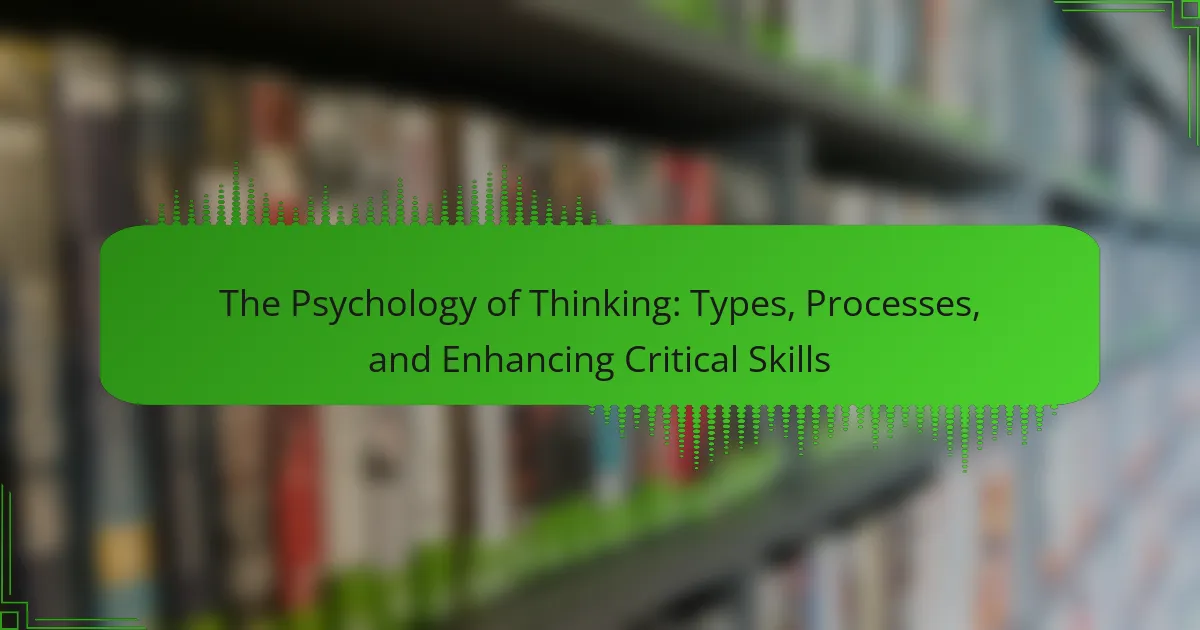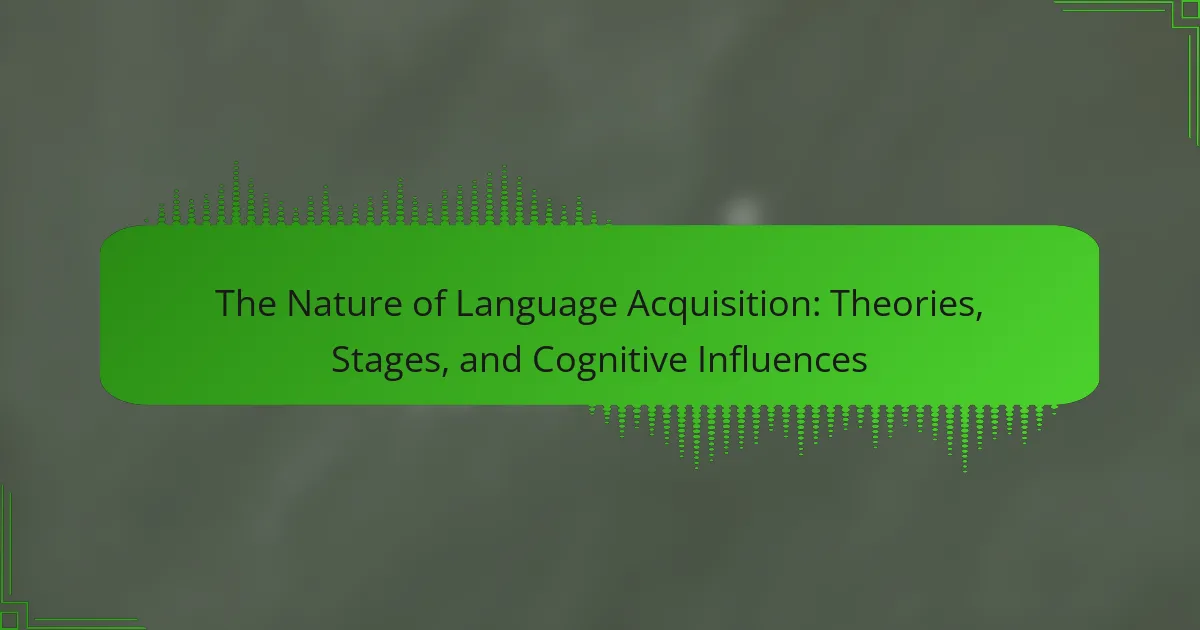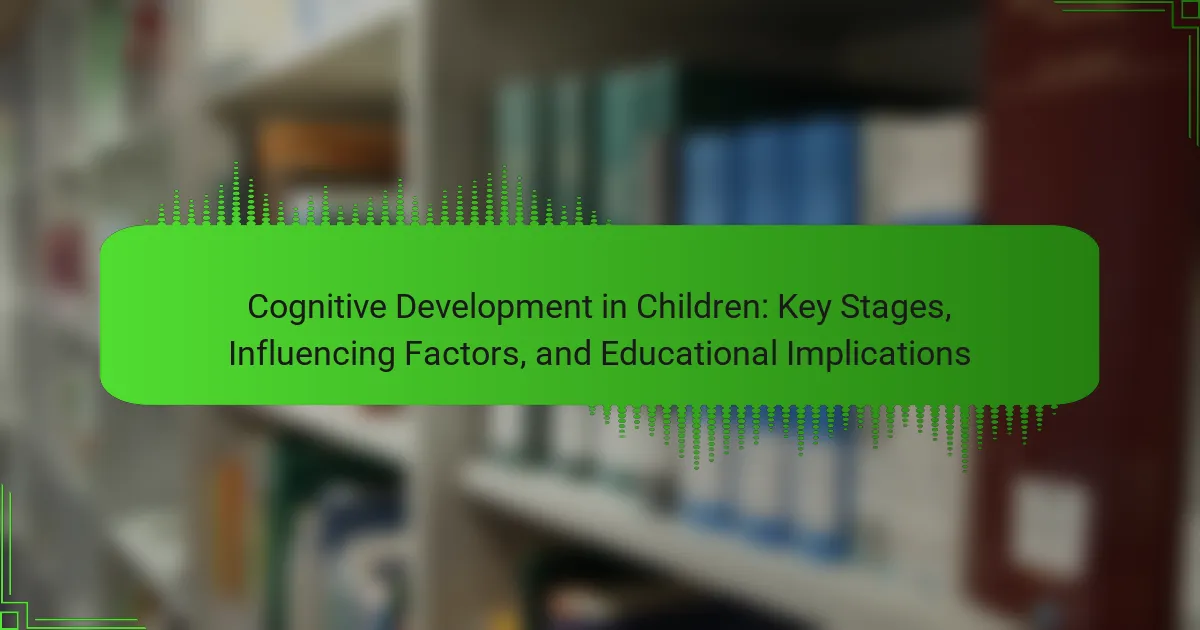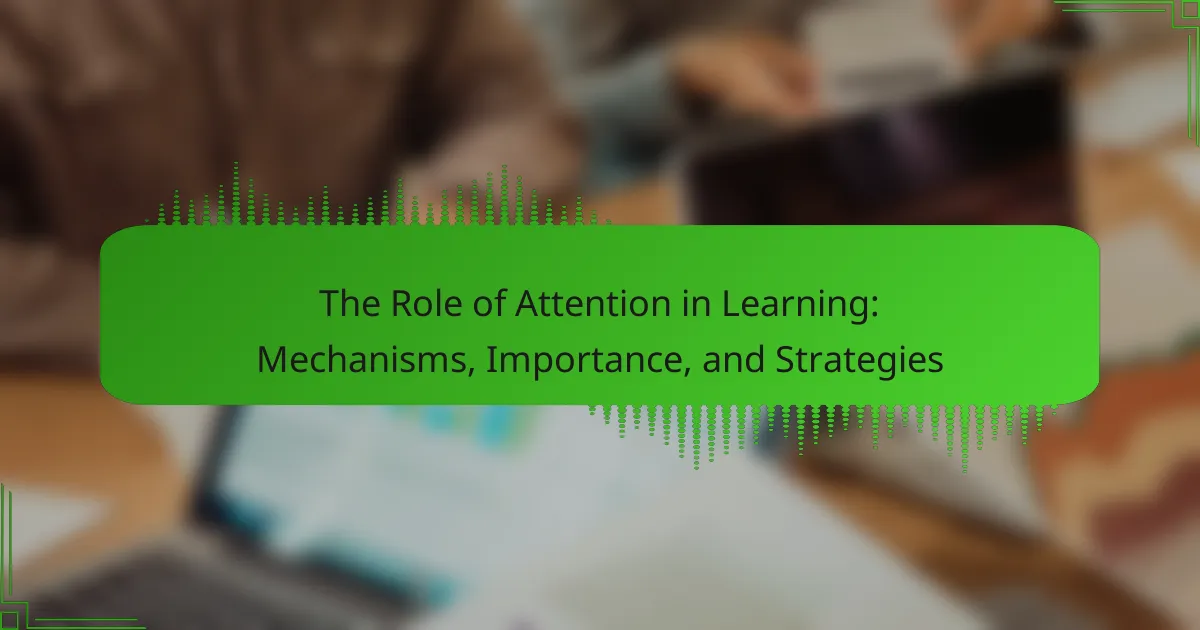The psychology of thinking encompasses the study of mental processes involved in acquiring knowledge and understanding, focusing on how individuals process information, solve problems, and make decisions. Key cognitive processes include perception, attention, memory, reasoning, and problem-solving, all of which interconnect to facilitate complex thought and effective decision-making. This article explores the significance of structured thinking and its impact on critical thinking skills, while also addressing cognitive biases and heuristics that influence judgment. Strategies for enhancing critical thinking, such as questioning assumptions and engaging with diverse perspectives, are discussed to promote better cognitive outcomes in various contexts.
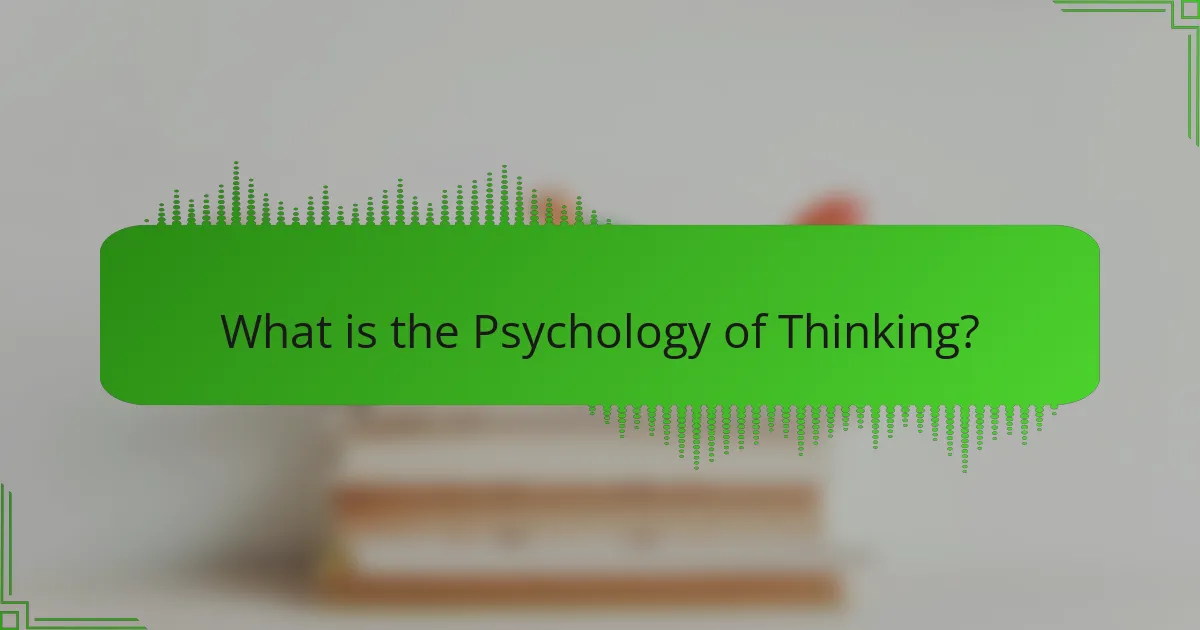
What is the Psychology of Thinking?
The psychology of thinking refers to the study of mental processes involved in acquiring knowledge and understanding. This field examines how individuals process information, solve problems, and make decisions. Cognitive psychology is a key area that explores these mental functions. Research shows that thinking involves various cognitive processes such as perception, memory, and reasoning. These processes are essential for effective problem-solving and critical thinking skills. Studies indicate that structured thinking enhances decision-making quality. The psychology of thinking also investigates biases and heuristics that affect judgment. Understanding these aspects can improve cognitive skills and promote better outcomes in various contexts.
How does thinking influence our daily lives?
Thinking significantly influences our daily lives by shaping our decisions and actions. It affects how we perceive situations and interpret information. Our thoughts determine our emotional responses to events. Positive thinking can lead to improved mental health and resilience. Conversely, negative thinking may result in stress and anxiety. Research shows that cognitive processes impact behavior and relationships. For example, studies indicate that individuals with a growth mindset achieve higher levels of success. Thus, the way we think directly influences our overall well-being and life satisfaction.
What are the different dimensions of thinking?
The different dimensions of thinking include critical thinking, creative thinking, analytical thinking, and reflective thinking. Critical thinking involves evaluating information and arguments logically. Creative thinking focuses on generating new ideas and solutions. Analytical thinking emphasizes breaking down complex problems into manageable parts. Reflective thinking encourages self-examination and learning from experiences. Each dimension plays a crucial role in problem-solving and decision-making processes. Understanding these dimensions can enhance overall cognitive abilities and improve critical skills.
How do cognitive processes shape our thoughts?
Cognitive processes shape our thoughts through mechanisms like perception, attention, memory, and reasoning. These processes filter and organize information from our environment. Perception allows us to interpret sensory input, influencing our understanding. Attention directs our focus to relevant stimuli, shaping our thoughts based on what we prioritize. Memory stores past experiences, which inform our current thinking. Reasoning enables us to draw conclusions and make decisions based on available information. Research indicates that these processes interact dynamically to influence our beliefs and behaviors. For example, studies show that selective attention can alter our perceptions and judgments, demonstrating the significant impact of cognitive processes on thought formation.
What are the key types of thinking?
The key types of thinking include critical thinking, creative thinking, analytical thinking, and reflective thinking. Critical thinking involves evaluating information and arguments to make informed decisions. Creative thinking focuses on generating new ideas and solutions. Analytical thinking emphasizes breaking down complex problems into smaller parts for better understanding. Reflective thinking encourages self-assessment and consideration of past experiences to inform future actions. These types of thinking are essential for effective problem-solving and decision-making in various contexts.
What is critical thinking and why is it important?
Critical thinking is the ability to analyze information and evaluate arguments logically. It involves assessing the validity of claims and identifying biases. Critical thinking is important because it enhances decision-making skills. It allows individuals to solve problems effectively and think independently. Research shows that critical thinking skills lead to better academic performance. A study by Facione (2011) highlights that critical thinking is essential for effective communication. It fosters creativity and innovation in various fields. Ultimately, critical thinking contributes to personal and professional success.
How does creative thinking differ from analytical thinking?
Creative thinking generates new ideas and concepts. It emphasizes imagination and innovation. Analytical thinking, on the other hand, focuses on logical reasoning and problem-solving. It involves breaking down complex information into manageable parts. Creative thinking often leads to unique solutions. This type of thinking is less constrained by existing frameworks. Analytical thinking relies on established rules and data interpretation. Research shows that both thinking styles are essential for effective problem-solving. Combining them can enhance overall cognitive flexibility.
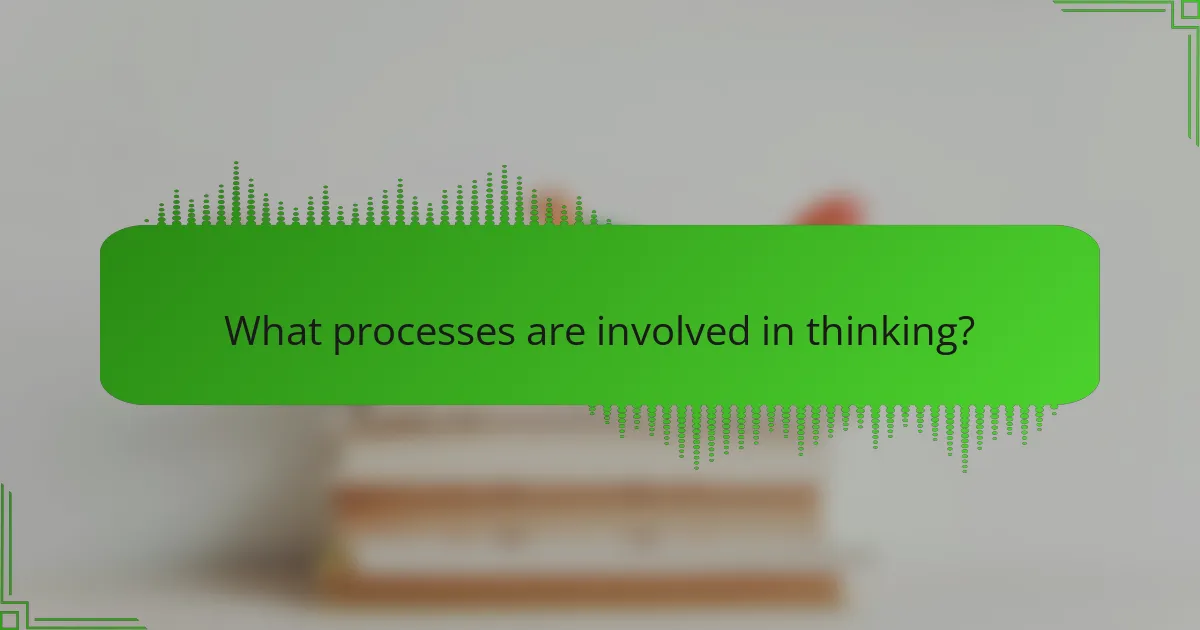
What processes are involved in thinking?
Thinking involves several cognitive processes. These processes include perception, attention, memory, reasoning, and problem-solving. Perception allows individuals to interpret sensory information. Attention focuses cognitive resources on specific stimuli. Memory stores and retrieves information for later use. Reasoning involves drawing conclusions from facts or premises. Problem-solving applies knowledge to overcome obstacles. Each process interconnects to facilitate complex thought. For instance, reasoning often relies on memory to recall relevant information. Research shows that these processes are essential for effective decision-making and learning.
How do we process information during thinking?
Information processing during thinking involves several cognitive steps. First, the brain encodes information through sensory input. This information is then stored in short-term memory for immediate use. If deemed important, it can be transferred to long-term memory for future retrieval. During thinking, individuals retrieve relevant information from memory. This retrieval process is influenced by prior knowledge and experiences. Next, the brain organizes the information to form connections and patterns. Finally, conclusions or decisions are made based on the processed information. Research shows that effective information processing enhances problem-solving and critical thinking skills.
What role does memory play in thinking processes?
Memory is essential for thinking processes. It allows individuals to store, retrieve, and utilize information. Working memory holds information temporarily for immediate tasks. Long-term memory stores knowledge and experiences for future use. Memory aids in problem-solving by recalling relevant information. It also supports decision-making through past experiences. Research shows that memory influences creativity and critical thinking. Effective memory use enhances cognitive flexibility and adaptability.
How do emotions affect our thinking?
Emotions significantly influence our thinking processes. They can enhance or impair cognitive functions. Positive emotions often lead to better problem-solving and creativity. For instance, joy can broaden attention and encourage flexible thinking. Conversely, negative emotions like fear or anger can narrow focus. This can result in rigid thinking and poor decision-making. Research by Joseph LeDoux highlights how fear can trigger a fight-or-flight response, affecting rational thought. Overall, emotions serve as a lens through which we interpret information and make decisions.
What are the stages of the thinking process?
The stages of the thinking process include problem identification, information gathering, evaluation of options, decision-making, and reflection. Problem identification involves recognizing and defining the issue at hand. Information gathering requires collecting relevant data and insights related to the problem. Evaluation of options entails analyzing potential solutions and their consequences. Decision-making is the act of selecting the most appropriate solution based on the evaluation. Finally, reflection involves assessing the decision’s effectiveness and learning from the outcome. This framework is supported by cognitive psychology research, which highlights these stages as essential for effective problem-solving and critical thinking.
How do we move from problem identification to solution?
To move from problem identification to solution, one must follow a systematic approach. First, clearly define the problem. This ensures a focused understanding of the issue at hand. Next, gather relevant information and data pertaining to the problem. This step allows for a comprehensive analysis. After that, brainstorm potential solutions. Engaging multiple perspectives can generate diverse ideas. Evaluate each solution based on feasibility and impact. This assessment helps in narrowing down viable options. Finally, implement the chosen solution and monitor its effectiveness. This process leads to informed decision-making and successful problem resolution.
What cognitive biases can impact our thinking?
Cognitive biases are systematic patterns of deviation from norm or rationality in judgment. They can significantly impact our thinking and decision-making processes. Common cognitive biases include confirmation bias, where individuals favor information that confirms their preexisting beliefs. Anchoring bias occurs when people rely too heavily on the first piece of information encountered. Availability heuristic leads to overestimating the importance of information readily available in memory. Hindsight bias involves seeing events as having been predictable after they have occurred. These biases can distort our perception and lead to flawed conclusions. Research shows that cognitive biases affect various fields, including economics and psychology, influencing decisions and behaviors.
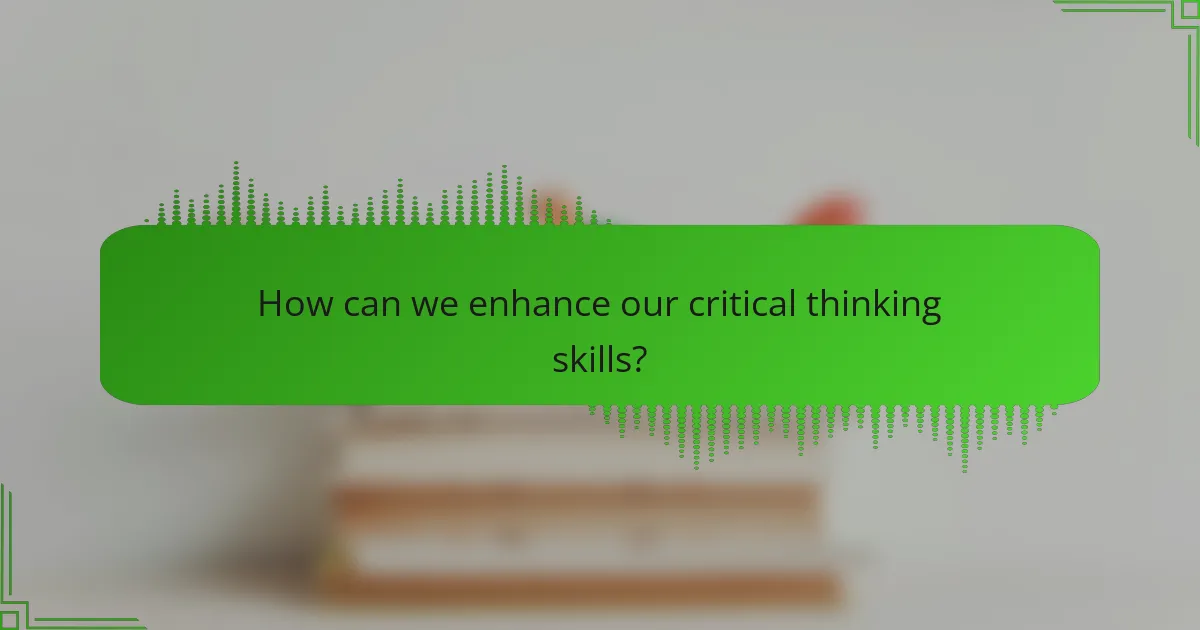
How can we enhance our critical thinking skills?
To enhance critical thinking skills, individuals can practice questioning assumptions. This involves evaluating the validity of beliefs and ideas. Engaging in discussions with diverse perspectives fosters deeper understanding. Analyzing arguments systematically improves reasoning abilities. Reflective journaling can clarify thought processes and enhance self-awareness. Reading widely exposes one to various viewpoints and enhances analytical skills. Participating in problem-solving activities encourages creative solutions. Research shows that these methods lead to improved critical thinking outcomes. For instance, a study by Facione (2011) indicates that structured approaches to reasoning significantly enhance critical thinking abilities.
What strategies can improve critical thinking?
Engaging in reflective thinking improves critical thinking. Reflective thinking involves analyzing one’s own beliefs and assumptions. It encourages questioning the validity of information. Practicing active listening enhances understanding of different perspectives. Active listening requires fully concentrating on the speaker. This approach fosters a deeper comprehension of arguments. Utilizing the Socratic method promotes critical questioning. The Socratic method involves asking probing questions to stimulate thought. Collaborating with others can also enhance critical thinking skills. Group discussions expose individuals to diverse viewpoints. Research indicates that these strategies can effectively enhance critical thinking abilities.
How does questioning assumptions lead to better thinking?
Questioning assumptions enhances thinking by promoting critical analysis. It encourages individuals to evaluate their beliefs and the rationale behind them. This process leads to the identification of biases and logical fallacies. When assumptions are challenged, new perspectives emerge. Research indicates that this practice fosters creativity and innovation. A study published in the Journal of Applied Psychology found that questioning assumptions improved problem-solving skills. Participants who engaged in this practice demonstrated higher adaptability in complex scenarios. Ultimately, questioning assumptions cultivates a more open-minded approach to learning and decision-making.
What role does reflection play in enhancing thinking skills?
Reflection plays a crucial role in enhancing thinking skills. It allows individuals to analyze their thoughts and experiences critically. Through reflection, one can identify strengths and weaknesses in their reasoning processes. This self-assessment fosters deeper understanding and promotes cognitive growth. Studies show that reflective practices improve problem-solving abilities and creativity. For instance, a study by Schön (1983) emphasizes the importance of reflection in professional development. Reflective thinking leads to better decision-making and more effective learning outcomes. Engaging in reflection regularly can significantly enhance overall cognitive function and critical thinking skills.
What common pitfalls should we avoid in thinking?
Common pitfalls to avoid in thinking include cognitive biases, overgeneralization, and confirmation bias. Cognitive biases can distort our perception of reality. For instance, the anchoring bias can lead us to rely too heavily on the first piece of information encountered. Overgeneralization involves making broad conclusions based on limited evidence. This can result in inaccurate beliefs about groups or situations. Confirmation bias leads individuals to seek information that supports existing beliefs while ignoring contradictory evidence. This can inhibit objective analysis. Additionally, emotional reasoning can cloud judgment. Decisions influenced by strong emotions may lack rationality. These pitfalls hinder effective problem-solving and critical thinking. Recognizing and mitigating these issues is essential for clearer, more rational thought processes.
How can we recognize and mitigate cognitive biases?
To recognize and mitigate cognitive biases, individuals must first become aware of their existence. Cognitive biases are systematic patterns of deviation from norm or rationality in judgment. Awareness can be increased through education about common biases, such as confirmation bias or anchoring bias.
Self-reflection is another effective method for recognizing biases. Regularly questioning one’s own decisions can reveal underlying biases. Seeking feedback from others can also help identify biases that one may overlook.
To mitigate cognitive biases, implementing structured decision-making processes is crucial. Techniques such as considering alternative viewpoints or using checklists can reduce bias influence.
Additionally, fostering an environment that encourages open dialogue can help challenge biased thinking. Research indicates that diverse teams are better at recognizing and overcoming biases (Page, S.E., “The Difference: How the Power of Diversity Creates Better Groups, Firms, Schools, and Societies,” 2007).
Lastly, practicing mindfulness can enhance awareness of cognitive processes and reduce bias. Mindfulness training has been shown to improve decision-making and critical thinking skills.
What practices can help maintain clarity in thought processes?
Practices that can help maintain clarity in thought processes include regular mindfulness meditation. Mindfulness meditation enhances focus and reduces distractions. Studies show that it can improve cognitive flexibility. Another effective practice is journaling thoughts daily. Journaling helps organize ideas and clarify emotions. Physical exercise also contributes to mental clarity. Exercise increases blood flow to the brain, enhancing cognitive function. Establishing a structured routine can further support clear thinking. Routines minimize decision fatigue and streamline daily tasks. Lastly, limiting information intake helps prevent overwhelm. Reducing noise from social media and news can enhance focus. These practices collectively foster a clearer and more organized thought process.
What are some practical tips for enhancing critical thinking?
To enhance critical thinking, practice questioning assumptions. This involves examining the basis of your beliefs and considering alternative viewpoints. Engage in reflective thinking by regularly analyzing your thought processes. This helps identify biases and improve reasoning skills.
Additionally, seek out diverse perspectives. Discussing ideas with others can challenge your thinking and provide new insights. Another effective strategy is to break problems into smaller parts. This simplifies complex issues and allows for more thorough analysis.
Finally, apply the Socratic method by asking open-ended questions. This encourages deeper exploration of topics and fosters a habit of inquiry. These methods collectively improve critical thinking skills, leading to better decision-making and problem-solving abilities.
The main entity of the article is the psychology of thinking, which encompasses the study of mental processes involved in knowledge acquisition and understanding. The article explores various cognitive processes, including perception, memory, and reasoning, and their roles in problem-solving and decision-making. It outlines different dimensions of thinking such as critical, creative, analytical, and reflective thinking, while also addressing cognitive biases that can impact judgment. Additionally, strategies for enhancing critical thinking skills and maintaining clarity in thought processes are discussed, providing practical tips for improving cognitive abilities and overall decision-making outcomes.
